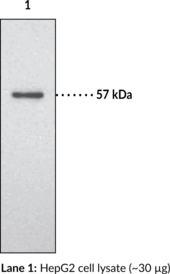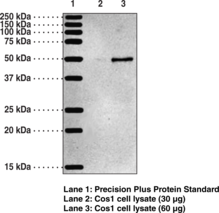Description
CD95 is a type I transmembrane glycoprotein receptor encoded by the FAS gene in humans.{49679} Alternative splicing of FAS generates a soluble form of the protein. CD95 is expressed by activated T and B cells, and thymocytes and has been found in the thymus, liver, heart, and kidney.{49678,49680,49681} CD95 is involved in the induction of apoptosis, as Fas ligand activation of CD95 leads to formation of a death-inducing signaling complex (DISC) comprised of CD95 oligomers, the Fas-associated death domain protein (FADD), procaspase-8, procaspase-10, and c-FLIP.{49682} DISC formation and CD95 internalization is rapid in type I apoptotic cells, where is it associated with plasma membrane lipid rafts, and delayed in type II apoptotic cells, where it is found in both lipid raft- and non-raft regions of the membrane.{49683,11907} CD95 has non-apoptotic activity as well, including activation of the NF-κB signaling pathway and inducing renal tubular epithelial cell migration, among others.{49681} Inhibition or activation of CD95 reduces or promotes cancer cell functions, respectively, in vitro and in vivo in animal models. However, high serum levels of CD95 in patients with various cancers are associated with metastasis, progression, and shorter survival. Mice lacking the gene for CD95 develop spontaneous autoimmunity and have been used as a model of systemic lupus erythematosus (SLE). Mutations in FAS are associated with various cancers and autoimmune lymphoproliferative syndrome (ALPS) type 1a, which is characterized by non-malignant lymphadenopathy and splenomegaly.{49682,49684} Cayman’s CD95 Monoclonal Antibody (Clone IPO-4) can be used for flow cytometry, immunocytochemistry (ICC), and immunohistochemistry (IHC; frozen sections) applications. The antibody recognizes CD95 from human samples.
Synonyms: APO-1|Apoptosis Antigen|APT|Cluster of Differentiation 95|Fas|TNFRSF6|Tumor Necrosis Factor Receptor Superfamily, Member 6
Immunogen:
Formulation: 100 µg of Protein A-purified IgM
Isotype:
Applications: FC, ICC, and IHC (frozen sections)
Origin: Animal/Mouse
Stability: 365 days
Application|Flow Cytometry||Application|Immunocytochemistry||Application|Immunohistochemistry||Product Type|Antibodies|Monoclonal Antibodies||Research Area|Cancer|Cell Death|Apoptosis||Research Area|Cell Biology|Cell Death|Apoptosis||Research Area|Cell Biology|Cell Signaling|NF-κB Signaling||Research Area|Epigenetics, Transcription, & Translation|Transcription Factors||Research Area|Immunology & Inflammation|Adaptive Immunity||Research Area|Immunology & Inflammation|Autoimmunity|Lupus


